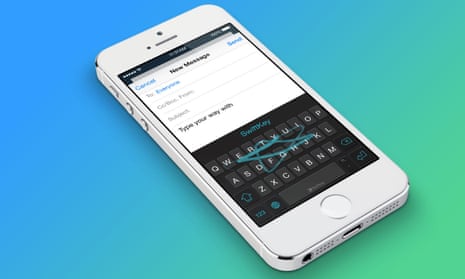A civil servant traded in his stake in the keyboard app SwiftKey in 2008 in exchange for a bike, only to see it grow into a £170m success – and to miss out on a payout that could have been worth £25m.
Chris Hill-Scott, a 29-year-old from Buckinghamshire, founded the startup bought by Microsoft on Wednesday with Cambridge-graduate friends Jon Reynolds, 30, and Ben Medlock, 26, in 2008. He was appointed director of SwiftKey’s parent company TouchType Ltd on 13 August, according to Companies House, but resigned just months later on 24 October that year.
The co-founder had reportedly become disillusioned with the long hours and financial insecurity inherent with leading a startup, according to the Times.
On Twitter on Wednesday, Hill-Scott, a University of Reading graduate, described the decision, eight years ago, as “the biggest mistake I ever made”, before setting his account to private following media attention.
A SwiftKey spokeswoman told the Times he had “left on good terms”, adding: “When SwiftKey was founded there were three founding members, Chris was a friend of Jon’s from school and Ben was a friend from his university in Cambridge. Two months after forming the company Chris decided to leave; Jon and Ben bought his shares.”

Hill-Scott embarked on a career in design and photography, becoming a contributor to several cycling magazines. He also shot action photos and portraits of BMX riders for several advertising campaigns. In 2014, he joined the Government Digital Service, which is responsible for revolutionising the UK government’s use of technology.
Without Hill-Scott, Reynolds and Medlock went on to release their first version of SwiftKey, which supported seven languages, for Android in July 2010.
The company released a succession of updates, signed licensing agreements with other companies, including the world’s largest smartphone manufacturer, Samsung, to power its built-in keyboards on Galaxy Android devices.
The company grew to more than 160 staff, with offices in Southwark, San Francisco and Seoul in South Korea, and reached 300 million users globally, with the SwiftKey app available for Android, BlackBerry, Windows Phone and Apple’s iOS.
The company’s artificial intelligence and typing prediction technology, regarded as one of the best in the world, has also been used beyond traditional smartphone keyboards, recently being built into the communication system for Stephen Hawking. It also gained funding from high-profile technology venture capital firm Index Ventures and many others, before being bought by Microsoft for $250m (£171m), earning Reynolds and Medlock £25m each.
The purchase is one of the most lucrative acquisitions of a British technology firm in recent years, following in the footsteps of artificial intelligence startup DeepMind, which was bought by Google in January 2014 for £400m. The purchase also valued SwiftKey at more than double its closest rival Swype, which also makes a predictive keyboard for Android and iOS, and was bought by voice-recognition company Nuance for $102.5m in 2011.
